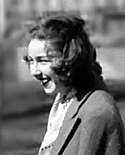Flannery O'Connor Quote
He had never thought himself a great sinner before but he saw now that his true depravity had been hidden from him lest it cause him despair. He realized that he was forgiven for sins from the beginning of time, when he had conceived in his own heart the sin of Adam, until the present, when he had denied poor Nelson. He saw that no sin was too monstrous for him to claim as his own, and since God loved in proportion as He forgave, he felt ready at that instant to enter Paradise.
Flannery O'Connor
He had never thought himself a great sinner before but he saw now that his true depravity had been hidden from him lest it cause him despair. He realized that he was forgiven for sins from the beginning of time, when he had conceived in his own heart the sin of Adam, until the present, when he had denied poor Nelson. He saw that no sin was too monstrous for him to claim as his own, and since God loved in proportion as He forgave, he felt ready at that instant to enter Paradise.
Related Quotes
About Flannery O'Connor
Mary Flannery O'Connor (March 25, 1925 – August 3, 1964) was an American novelist, short story writer and essayist. She wrote two novels and 31 short stories, as well as a number of reviews and commentaries.
She was a Southern writer who often wrote in a sardonic Southern Gothic style and relied heavily on regional settings and grotesque characters, often in violent situations. An unsentimental acceptance or rejection of the limitations, imperfections or differences of these characters (whether attributed to disability, race, crime, religion or sanity) typically underpins the drama.
Her writing reflects her Roman Catholic faith and frequently examines questions of Catholicism-defined morality and ethics. Her posthumously compiled Complete Stories won the 1972 U.S. National Book Award for Fiction and has been the subject of enduring praise.
She was a Southern writer who often wrote in a sardonic Southern Gothic style and relied heavily on regional settings and grotesque characters, often in violent situations. An unsentimental acceptance or rejection of the limitations, imperfections or differences of these characters (whether attributed to disability, race, crime, religion or sanity) typically underpins the drama.
Her writing reflects her Roman Catholic faith and frequently examines questions of Catholicism-defined morality and ethics. Her posthumously compiled Complete Stories won the 1972 U.S. National Book Award for Fiction and has been the subject of enduring praise.
